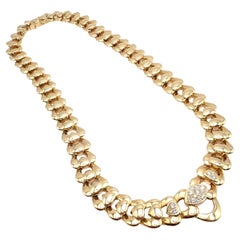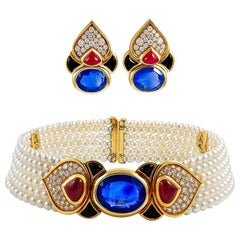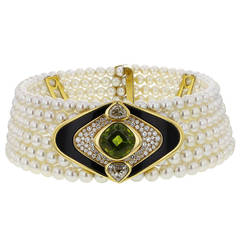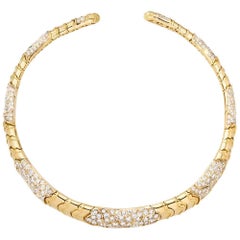Marina B Diamond Choker
1990s Italian Choker Necklaces
Diamond, Yellow Gold
Vintage 1980s Italian Choker Necklaces
Diamond, Pearl, Ruby, Sapphire, 18k Gold
Recent Sales
Vintage 1980s Choker Necklaces
Cultured Pearl, Diamond, Onyx, Peridot, 18k Gold
Mid-20th Century French Contemporary Choker Necklaces
Diamond, 18k Gold
Vintage 1980s Italian Choker Necklaces
Diamond, 18k Gold
20th Century Italian Choker Necklaces
Onyx, Diamond, 18k Gold
Vintage 1980s Italian Choker Necklaces
Diamond, 18k Gold
Vintage 1980s Italian Choker Necklaces
Diamond, 18k Gold
Late 20th Century Italian Choker Necklaces
Diamond, Topaz, 18k Gold, Yellow Gold, Base Metal
Late 20th Century Contemporary Choker Necklaces
Diamond, 18k Gold
Vintage 1970s Italian Modern Choker Necklaces
White Diamond, Ruby, Blue Sapphire, 18k Gold
Italian Choker Necklaces
Diamond, Topaz
Vintage 1980s Italian Choker Necklaces
Hematite, White Diamond, 18k Gold
Vintage 1980s European Modern Choker Necklaces
Diamond, Yellow Gold
21st Century and Contemporary American Choker Necklaces
Pearl, White Diamond, 18k Gold, Yellow Gold
20th Century Italian Modern Choker Necklaces
Diamond, Yellow Gold, 18k Gold
Vintage 1980s Italian Choker Necklaces
Diamond, Tourmaline, Topaz, Yellow Gold, Base Metal, 18k Gold
Vintage 1980s Italian Choker Necklaces
Blue Sapphire, Emerald, White Diamond, 18k Gold
Vintage 1970s French Choker Necklaces
Diamond, Citrine, 18k Gold, Yellow Gold, Gold
Vintage 1970s French Choker Necklaces
Diamond, 18k Gold, Yellow Gold
Vintage 1980s French Choker Necklaces
Diamond, Emerald, Onyx, Pearl, Ruby, Gold, 18k Gold, Yellow Gold, Steel
Late 20th Century Italian Choker Necklaces
Diamond, 18k Gold
21st Century and Contemporary Italian Retro Choker Necklaces
Diamond, 18k Gold
Vintage 1980s Italian Choker Necklaces
Amethyst, Diamond, 18k Gold, Steel
Vintage 1980s Italian Choker Necklaces
Diamond, 18k Gold, White Gold, Mixed Metal
21st Century and Contemporary French Contemporary Choker Necklaces
Diamond, Yellow Gold
21st Century and Contemporary American Choker Necklaces
White Diamond, 18k Gold, Yellow Gold
Vintage 1980s Italian Choker Necklaces
Diamond, Topaz, Tourmaline, 18k Gold, Yellow Gold, Base Metal
Vintage 1980s Italian Choker Necklaces
Diamond, Topaz, Tourmaline, 18k Gold, Yellow Gold, Base Metal
20th Century French Retro Choker Necklaces
White Diamond, 18k Gold, Yellow Gold
Vintage 1980s French Choker Necklaces
Diamond, 18k Gold
2010s Choker Necklaces
Diamond, 18k Gold, Yellow Gold
Swiss Choker Necklaces
Diamond
21st Century and Contemporary Italian Contemporary Choker Necklaces
Diamond, 18k Gold
21st Century and Contemporary Italian Choker Necklaces
Cultured Pearl, Diamond, White Diamond, 18k Gold, Yellow Gold
Vintage 1980s Italian Choker Necklaces
White Diamond, 18k Gold
Vintage 1980s French Choker Necklaces
Diamond, 18k Gold
Swiss Choker Necklaces
French Choker Necklaces
20th Century Italian More Necklaces
Diamond, 18k Gold
20th Century Italian More Necklaces
Diamond, 18k Gold
People Also Browsed
1990s Italian Sleeveless Shirts
Early 2000s Italian Top Handle Bags
Early 2000s French Day Dresses
Early 2000s French Evening Dresses and Gowns
21st Century and Contemporary Artist Dome Rings
Diamond, Gold
Early 2000s Mini Dresses
Early 2000s Evening Dresses and Gowns
Vintage 1980s French Drop Earrings
Diamond, Onyx, Peridot, 18k Gold
Vintage 1980s American Drop Earrings
Yellow Gold
21st Century and Contemporary British Blouses and Tops
21st Century and Contemporary Band Rings
Diamond, Ruby, Pink Sapphire, 18k Gold, Gold, Rose Gold
20th Century French Modern Brooches
Diamond, Pearl, Sapphire, Platinum
Early 2000s French Evening Dresses and Gowns
20th Century Italian Contemporary Wrist Watches
Coral, 18k Gold
1980s French Skirt Suits
2010s Top Handle Bags
Marina B Diamond Choker For Sale on 1stDibs
How Much is a Marina B Diamond Choker?
Marina B for sale on 1stDibs
No stranger to fanciful, bold jewelry designs, Marina Bulgari is the granddaughter of the founder of the legendary luxury house BVLGARI. In the 1970s, she established her own brand, Marina B, and her vibrantly colored, exclusive accessories were widely coveted by jewelry lovers of the 1980s. The same goes for the collectors of today.
When her grandfather Sotirios passed away in 1932, Marina Bulgari’s father Constantino took over the iconic jewelry house alongside his brother Giorgio. Since she was a child, her passion for art and design was wholly enriched and broadened thanks to the historically celebrated family business that was growing in popularity around her. She studied at Saint Mary’s College in England and upon graduating began to contribute her own designs to BVLGARI. When her uncle Giorgio died in 1966, Marina began to help run the business. When her father passed away in 1973, she took his place at the luxury house and remained there for three more years before striking out on her own.
The first Marina B boutique opened in Geneva in 1978. In the years that followed, more locations were established in Milan, New York City and Paris. Marina’s brand embodied luxurious, easy-to-wear jewelry — for women, by women. Women of the era were newly independent, and the jewelry industry — its workshops, boutiques, and other areas of the business — had long been led by men. Alongside Marina, the likes of Elsa Peretti, Angela Cummings and a range of others whose work is still being brought to light today would change that.
Elizabeth Taylor — a dedicated enthusiast of BVLGARI’s dazzling eye candy and the sinuous snake motif that has come to be synonymous with the brand — was among the high-profile admirers of Marina B jewelry in its early days, and her accessories could frequently be seen as part of Taylor’s red carpet ensembles. Marina drew on Japanese and Byzantine traditions and created adornments that were stylized and graphic. Her work was fresh and innovative — for her Pneu collection, she created earrings that could be worn as either drop earrings or studs and in 1980, she unveiled a unique gem cut she called the Chestnut, which landed somewhere between a trilliant cut and a pear cut. This would become a signature of the brand.
Marina introduced other major collections such as the Shirine in 1984 as well as the Atomo and Cardan collections in 1989 before retiring during the 1990s. Ahmed Fitahihi, a Saudi Arabian sheik, bought the company in 1999 before it changed hands again in 2011 when it was acquired by the chief executive of Windsor Jewelers, Paul Lubetsky. In 2017, Italian-born French jewelry designer Guy Bedarida — an alum of Boucheron, Van Cleef & Arpels and a former creative director at John Hardy — took over as majority shareholder and creative director at the band.
Hollywood starlets how found a lot to love about Marina’s designs over the years. In addition to Elizabeth Taylor, her work was worn by Sophia Loren and Grace Kelly. Marina B choker necklaces are popular among contemporary musicians like Rihanna who wore one at the opening ceremony of Rihanna Drive in Barbados and Alicia Keys, who donned a Marina B choker at her 2013 Superbowl performance.
Find Marina B earrings, rings, necklaces and bracelets on 1stDibs.
Why Gold Shines in Jewelry Craftsmanship
Gold is the feel-good metal, the serotonin of jewelry. Wear vintage and antique gold necklaces, watches, gold bracelets or gold rings and you feel happy, you feel dressed, you feel, well, yourself.
Gold, especially yellow gold, with its rich patina and ancient pedigree going back thousands of years, is the steady standby, the well-mannered metal of choice. Any discussion of this lustrous metal comes down to a basic truth: Gold is elementary, my dear. Gold jewelry that couples the mystique of the metal with superb design and craftsmanship achieves the status of an enduring classic. Many luxury houses have given us some of our most treasured and lasting examples of gold jewelry over the years.
Since its founding, in 1837, Tiffany & Co. has built its reputation on its company jewelry as well as its coterie of boutique designers, which has included Jean Schlumberger, Donald Claflin, Angela Cummings and Elsa Peretti. There are numerous gold Tiffany classics worth citing. Some are accented with gemstones, but all stand out for their design and the workmanship displayed.
For the woman who prefers a minimalist look, the Tiffany & Co. twist bangle (thin, slightly ovoid) is stylishly simple. For Cummings devotees, signature pieces feature hard stone inlay, such as her pairs of gold ear clips inlaid with black jade (a play on the classic Chanel black and tan), or bangles whose design recalls ocean waves, with undulating lines of lapis lazuli and mother-of-pearl. And just about any design by the great Jean Schlumberger is by definition a classic.
Even had he eschewed stones and diamonds, Southern-born David Webb would be hailed for the vast arsenal of heavy gold jewelry he designed. Gold, usually hammered or textured in some manner, defines great David Webb jewelry. The self-taught jeweler made very au courant pieces while drawing inspiration from ancient and out-of-the-way sources — East meets West in the commanding gold necklaces made by Webb in the early 1970s. The same could be said for his endlessly varied gold cuffs.
In Europe, many houses have given us gold jewelry that sets the highest standard for excellence, pieces that were highly sought after when they were made and continue to be so.
Numerous designs from Cartier are homages to gold. There are the classic Trinity rings, necklaces and bracelets — trifectas of yellow, white and rose gold. As a testament to the power of love, consider the endurance of the Cartier Love bracelet.
Aldo Cipullo, Cartier’s top in-house designer from the late 1960s into the early ’70s, made history in 1969 with the Love bracelet. Cipullo frequently said that the Love bracelet was born of a sleepless night contemplating a love affair gone wrong and his realization that “the only remnants he possessed of the romance were memories.” He distilled the urge to keep a loved one close into a slim 18-karat gold bangle.
BVLGARI and its coin jewelry, gemme nummarie, hit the jackpot when the line launched in the 1960s. The line has been perennially popular. BVLGARI coin jewelry features ancient Greek and Roman coins embedded in striking gold mounts, usually hung on thick link necklaces of varying lengths. In the 1970s, BVLGARI introduced the Tubogas line, most often made in yellow gold. The Tubogas watches are classics, and then there is the Serpenti, the house's outstanding snake-themed watches and bracelets.
A collection called Monete that incorporated the gold coins is one of several iconic BVLGARI lines that debuted in the 1970s and ’80s, catering to a new generation of empowered women. Just as designers like Halston and Yves Saint Laurent were popularizing fuss-free ready-to-wear fashion for women on the go, BVLGARI offered jewels to be lived in.
Since Van Cleef & Arpels opened its Place Vendôme doors in 1906, collection after collection of jewelry classics have enchanted the public. As predominantly expressed in a honeycomb of gold, there is the Ludo watch and accessories, circa the 1920s, and the golden Zip necklace, 1951, whose ingenious transformation of the traditional zipper was originally proposed by the Duchess of Windsor. Van Cleef's Alhambra, with its Moroccan motif, was introduced in 1968 and from the start its popularity pivoted on royalty and celebrity status. It remains one of VCA’s most popular and collected styles.
Mention must be made of Buccellati, whose name is synonymous with gold so finely spun that it suggests tapestry. The house’s many gold bracelets, typically embellished with a few or many diamonds, signified taste and distinction and are always in favor on the secondary market. Other important mid-20th-century houses known for their gold-themed jewelry include Hermès and Ilias Lalaounis.
Find a stunning collection of vintage and antique gold jewelry on 1stDibs.
The Legacy of Diamond in Jewelry Design
Antique diamond rings, diamond tiaras and dazzling vintage diamond earrings are on the wish lists of every lover of fine jewelry. And diamonds and diamond jewelry are primarily associated with storybook engagements and red-carpet grand entrances — indeed, this ultra-cherished gemstone has a dramatic history on its hands.
From “A Diamond Is Forever” to “Diamonds Are a Girl’s Best Friend,” pop culture has ingrained in our minds that diamonds are the most desired, the most lasting and the most valuable gemstone. But what makes the diamond so special? Each stone — whether it’s rubies, sapphires or another stone — is unique and important in its own right. April babies might claim diamonds for themselves, but just about everyone wants this kind of sparkle in their lives!
There are several factors that set diamonds apart from other stones, and these points are important to our gem education.
Diamonds are minerals. They are made up of almost entirely of carbon (carbon comprises 99.95 percent; the remainder consists of various trace elements). Diamonds are the hardest gemstones, ranking number 10 on the Mohs Hardness Scale. Even its name, diamond, is rooted in the Greek adamas, or unconquerable. The only object that can scratch a diamond is another diamond. Diamonds are formed deep within the earth at very high temperatures (1,652–2,372 degrees Fahrenheit at depths between 90 and 120 miles beneath the earth’s surface) and are carried up by volcanic activity. Diamonds are quite rare, according to the Gemological Institute of America, and only 30 percent of all the diamonds mined in the world are gem quality.
In the 1950s, the Gemological Institute of America developed the 4Cs grading system to classify diamonds: clarity, color, cut and carat weight. Not all diamonds are created equal (there are diamonds, and then there are diamonds). The value of the diamond depends on the clarity (flawless diamonds are very rare but a diamond's value decreases if there are many blemishes or inclusions), color (the less color the higher the grade), cut (how the diamond’s facets catch the light, certain cuts of diamonds show off the stone better than others) and carat weight (the bigger, the better).
When you start shopping for a diamond engagement ring, always prioritize the cut, which plays the largest role in the diamond's beauty (taking the time to clean your diamond ring at least every six months or so plays a role in maintaining said beauty). And on 1stDibs, a range of buying guides can be found for those in the market for antique engagement rings, vintage engagement rings or Art Deco engagement rings.
Shop antique and vintage diamond rings, diamond necklaces and other extraordinary diamond jewelry on 1stDibs.
Finding the Right Choker-necklaces for You
Vintage choker necklaces are elegant, alluring and stylish. Cameos, pearls, diamonds and other stones can decorate these necklaces, which come in single or multiple strands. Whether it is a statement piece or a delicate chain, these short necklaces always stand out and turn heads.
The history of the choker can be traced back thousands of years, with Sumerian examples discovered from 2600–2500 B.C. They endured as a popular form of adornment through the centuries, and during the French Revolution they took on a symbolic significance. Women wore ribbons around their throats to mark the passing of those killed by the guillotine. Soon, the plain ribbons were adorned with small cameos and other ornamentation.
European choker necklaces gained a salacious reputation in the 19th century when prostitutes were associated with black ribbons tied around the neck, such as the model in Édouard Manet’s Olympia (1863). Queen Alexandra, Princess of Wales, reversed the trend in the late 19th century by wearing a large pearl and diamond choker, reputedly to hide a scar.
Fashioned from gold, pearls and other precious stones and metals, chokers continued to be worn into the 20th century, alternately statements of wealth and rebellion. They experienced periods of revival in the 1920s, ’40s, ’70s and ’90s for both men and women.
Vintage chokers make a statement with an unmistakable air of femininity. On 1stDibs, find an alluring collection of vintage chokers today, including gold, sapphire and emerald chokers.



